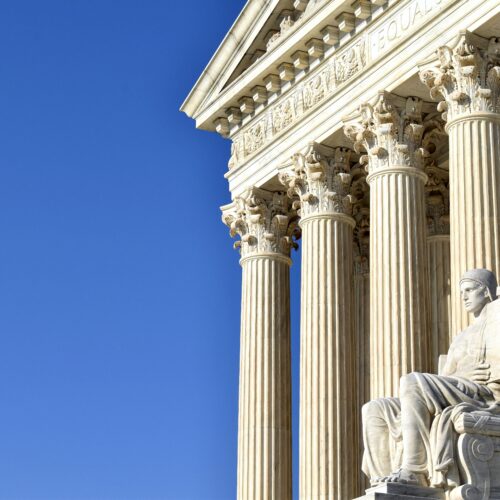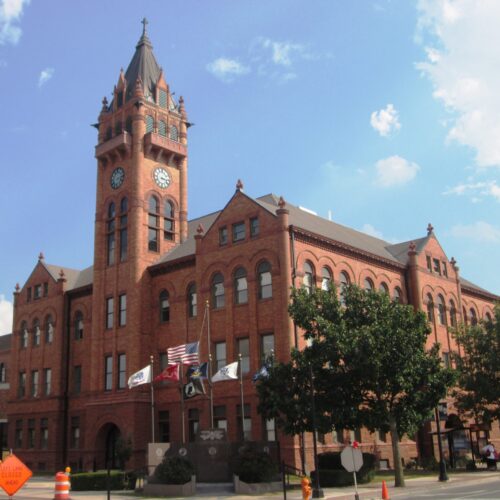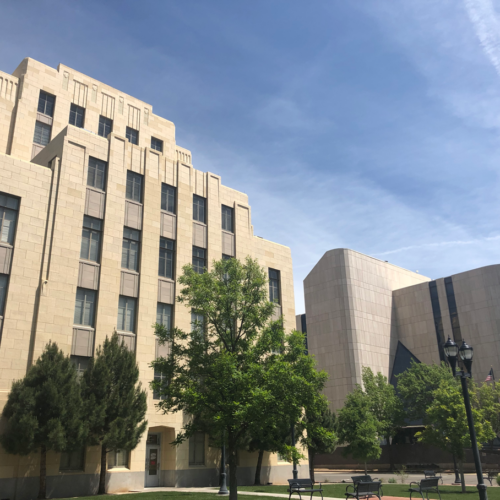Federal committee recommends independence of the defense function

Pleading the Sixth: Kept under wraps since being issued in November 2017, the report of the committee appointed by U.S. Supreme Court Chief Justice Roberts to study the provision of the Sixth Amendment right to counsel in the federal courts was released today. Foremost among its recommendations is that Congress must act to ensure that the defense function is independent of and removed from the oversight of the judiciary. As state policymakers and criminal justice stakeholders look to the federal defender system as a model, there should no longer be any debate about whether states should ensure defender independence from judges.
In 2015, Chief Justice Roberts appointed the Ad Hoc Committee to Review the Criminal Justice Act to evaluate the provision of the right to counsel in the federal courts. The committee worked over two years, holding “seven hearings around the country that drew 229 witnesses, nearly all of whom also submitted in-depth written testimony that totaled more than 2,300 pages,” and it sought as much quantitative data as could be obtained.
In November 2017, the committee issued its report: “Studying the system as a whole and hearing from hundreds of witnesses from around the country led Committee members to the unanimous conclusion that the current administrative structure of the CJA is flawed, defeating the best efforts of everyone dedicated to consistently deliver independent and effective representation.” To cure these deficiencies, the committee recommends that the provision of the Sixth Amendment right to counsel must be removed from the oversight of the judiciary. In the words of the report:
After two years of study, this Committee unanimously believes that the federal defense program should be governed by an independent entity with the same mission as frontline defenders. Current governance of the program by the Judicial Conference of the United States and management by the Administrative Office of the U.S. Courts, with their different missions and competing budgetary needs, has led to fundamental fissures and inequities in a system that nearly 250,000 people each year depend upon for effective representation in federal court.
The report is finally made public today as the Judicial Conference takes its first actions on the 35 recommendations the committee made for interim steps to improve the CJA system until Congress creates an independent federal defender commission.
Public defense services in the federal courts
The system for providing the Sixth Amendment right to counsel in the federal courts was established by Congress in 1964 with passage of the Criminal Justice Act. After modifications enacted in 1970, today indigent defense services are provided through a combination of government employees in federal public defender offices, contracts with non-profit law firms known as community defender organizations, and private attorneys who are paid hourly and referred to as CJA panel attorneys.
Congress statutorily designed the entire system to be administered by the Judicial Conference and the Administrative Office of the U.S. Courts (“AOC”). The Judicial Conference, composed entirely of federal judges, establishes the rules, including setting the hourly rate paid to the CJA panel attorneys and the presumptive maximum amount an attorney may be paid for a single case. The AOC manages the funds that Congress appropriates for indigent defense services.
The federal public defender offices and community defender organizations have a modicum of independence from the federal judiciary. District and circuit court judges determine whether to have one of these defender offices in each judicial district, what type it will be, and whether it should be closed or its type changed. While in operation though, both of these office types “receive an annual budget, have salaried employees, and have the freedom to hire experts, use investigators and paralegals, or purchase computers and software as needed without judicial approval.”
CJA panel attorneys face more direct judicial interference in their representation of indigent defendants. “In most districts, judges decide which attorneys may be on the panel, how cases are assigned, and whether attorneys should be removed from the panel.” Moreover, “in almost every district it is the presiding district judge who must approve a voucher before it can be paid” to the defense attorney.
The case for independence from the judiciary
The report explains the overarching problems of having judges oversee the provision of the right to counsel:
[B]oth panel attorneys as well as institutional defenders are unduly constrained by the nature and degree of judicial oversight built into the Criminal Justice Act . . .
On the whole, the judiciary has had the best intentions in administering the Criminal Justice Act, and individual judges and administrative leaders have been careful stewards of a system created to protect a crucial right. But they are operating within a fundamentally flawed administrative structure. Tasking – and indeed burdening – federal judges with the responsibility for managing the provision of public defense creates conflicts of interest and other serious impediments to genuine justice.
Those structural problems include giving the judiciary control over the defense budget; giving individual judges sole authority to appoint counsel and determine staffing levels at federal defender offices; and letting judges decide what, if any, resources attorneys may or may not use in defending their clients and what constitutes fair compensation for their legal services.
Whether in a state or federal court, when public defense attorneys are provided through a system controlled by the judges, the defense attorneys inevitably bring into their calculations what they think they need to do to stay in favor with the judge who appoints and pays them, thereby not focusing solely on providing constitutionally effective representation to each and every defendant as is their duty. Public defense attorneys in judicially controlled systems understand that their personal compensation along with the resources needed to properly defend an indigent person require the tacit or direct approval of the judges. And so, it does not take a judge to say overtly, for example: “Do not file motions in my courtroom.” Fearing loss of income from not pleasing the judge, appointed attorneys often take on more cases than they can ethically handle, delay working on cases, and triage their available hours in favor of some clients but to the detriment of others, thereby failing to meet the parameters of ethical representation owed to all clients.
Acknowledgement that the Sixth Amendment right to counsel must be free of both judicial and political interference is not new, as both the committee report and U.S. Supreme Court case law show. As the Criminal Justice Act was being considered in 1964, the “Judicial Conference privately urged the [Johnson] Administration and Congress to find someone else to run the program,” because “the mission and practice of the public defense function was a poor match with the goals and expertise of the judiciary.” Still, because the Department of Justice could not oversee both prosecution and defense, and no other agency in the executive branch “seemed well suited,” the federal indigent defense program was placed in the judicial branch as the “’least bad’ option.” Merely five years into the program, “Chief Justice Warren E. Burger lamented that [Congress] had not created a separate entity to run the program.” He believed judges should maintain a “real and an active interest,” but felt “the governance of a public defender or a legal aid system should be insulated from the courts.” The first and only study of the federal indigent defense system prior to the one released today occurred in 1993. Known as the Prado Committee, its “centerpiece recommendation . . . was to create an independent defense agency under the judiciary,” yet the Judicial Conference then “rejected the call for independence.”
In the 1979 case of Ferri v. Ackerman, the Supreme Court states that “independence” of appointed counsel to act as an adversary is an “indispensable element” of “effective representation.” Two years later, the Court determined in Polk County v. Dodson that states have a “constitutional obligation to respect the professional independence of the public defenders whom it engages.” Observing that “a defense lawyer best serves the public not by acting on the State’s behalf or in concert with it, but rather by advancing the undivided interests of the client,” the Court concluded that a “public defender is not amenable to administrative direction in the same sense as other state employees.”
This is confirmed in Strickland v. Washington, decided in 1984, where the Court states that “independence of counsel” must be “constitutionally protected” and that “[g]overnment violates the right to effective assistance when it interferes in certain ways with the ability of counsel to make independent decisions about how to conduct the defense.” Another case heard and decided on the same day, United States v. Cronic, explains that a deficient indigent defense system can make any lawyer – even the best attorney – perform in a non-adversarial way that results in the denial of the right to counsel.
In Cronic, the Court pointed to the case of Powell v. Alabama – known historically as the “Scottsboro Boys” case – as demonstrating the denial of the right to counsel even where a lawyer was technically appointed. The trial judge who oversaw the Scottsboro Boys’ case appointed a real estate lawyer from Chattanooga, who was not licensed in Alabama and was admittedly unfamiliar with the state’s rules of criminal procedure. The trials proceeded immediately on the same day that unqualified counsel was appointed. But perhaps the most noted critique of the Scottsboro Boys’ defense was that it lacked independence from governmental interference, specifically from the judge presiding over the case. In specific relation to judicial interference, the Powell Court stated:
[H]ow can a judge, whose functions are purely judicial, effectively discharge the obligations of counsel for the accused? He can and should see to it that, in the proceedings before the court, the accused shall be dealt with justly and fairly. He cannot investigate the facts, advise and direct the defense, or participate in those necessary conferences between counsel and accused which sometimes partake of the inviolable character of the confessional.
In other words, it is never possible for a judge presiding over a case to properly assess the quality of a defense lawyer’s representation, because the judge can never, for example, read the case file, question the defendant as to his stated interest, follow the attorney to the crime scene, or sit in on witness interviews. That is not to say a judge cannot provide sound feedback on an attorney’s in-court performance – the appropriate defense supervisors indeed should actively seek to learn a judge’s opinion on attorney performance. It is just that the judge’s in-court observations of a defense attorney cannot comprise the totality of supervision.
Conclusion
The report released today is cause for hope. It says:
Congress should create an autonomous entity, not subject to judicial oversight and approval. . . . Today, a preponderance of defense attorneys, federal judges, and outside experts believe the time has come to create an independent entity with the same mission as frontline defenders. . . . Genuine independence is crucial to providing a high-quality defense—not just in some cases but in all cases.
Change of this magnitude will necessarily take time, in no small part because it requires the action of Congress. This report should be a touchstone to begin active dialogue at the highest reaches of the federal government.


